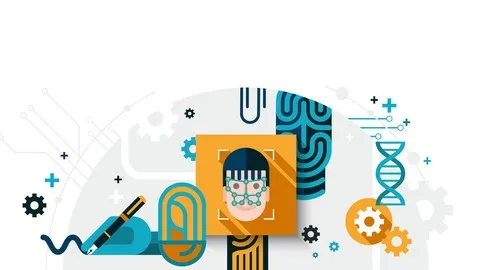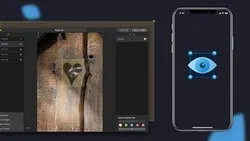
Learn Computer Vision with OpenCV Library using Python 
This free course teaches students how to use the OpenCV library with Python to build a face detection program. Gain the skills to develop computer vision applications with OpenCV. ▼
ADVERTISEMENT
Course Feature
![]() Cost:
Cost:
Free
![]() Provider:
Provider:
Udemy
![]() Certificate:
Certificate:
No Information
![]() Language:
Language:
English
![]() Start Date:
Start Date:
Self Paced
Course Overview
❗The content presented here is sourced directly from Udemy platform. For comprehensive course details, including enrollment information, simply click on the 'Go to class' link on our website.
Updated in [April 29th, 2023]
Welcome to Learn Computer Vision with OpenCV Library using Python! This course will help you to understand the fundamentals of computer vision and how to use the OpenCV library to create your own image face detection software. You will learn about the various image processing tools and how to utilize the OpenCV library to use various image filtering methods.
Course Overview: This course will provide you with a comprehensive overview of the OpenCV library and its various features. You will learn how to use the library to create your own image face detection software and how to use various image processing tools. You will also learn how to utilize the OpenCV library to use various image filtering methods.
Possible Development Directions: After completing this course, you will be able to create your own image face detection software and use various image processing tools. You will also be able to use the OpenCV library to use various image filtering methods. Additionally, you will be able to apply the knowledge you have gained to other computer vision projects.
Related Learning Suggestions: To further your knowledge of computer vision, you may want to consider taking courses on machine learning, deep learning, and artificial intelligence. Additionally, you may want to explore other libraries such as TensorFlow and PyTorch. Finally, you may want to look into other computer vision projects such as object detection and image segmentation.
[Applications]
After completing this course, students can apply their knowledge of the OpenCV library to create their own image face detection software. They can also use the various image processing tools to enhance their images and apply various image filtering methods. Additionally, they can use the OpenCV library to develop applications for computer vision, such as object recognition, motion detection, and image segmentation.
[Career Paths]
1. Computer Vision Engineer: Computer Vision Engineers are responsible for developing and implementing computer vision algorithms and systems. They use OpenCV and other computer vision libraries to create software that can detect and recognize objects, faces, and other features in images and videos. This field is rapidly growing, as computer vision technology is being used in a variety of applications, such as autonomous vehicles, medical imaging, and facial recognition.
2. Machine Learning Engineer: Machine Learning Engineers use OpenCV and other computer vision libraries to develop and implement machine learning algorithms. They use these algorithms to create software that can detect and recognize objects, faces, and other features in images and videos. This field is rapidly growing, as machine learning technology is being used in a variety of applications, such as autonomous vehicles, medical imaging, and facial recognition.
3. Robotics Engineer: Robotics Engineers use OpenCV and other computer vision libraries to develop and implement robotics algorithms. They use these algorithms to create software that can detect and recognize objects, faces, and other features in images and videos. This field is rapidly growing, as robotics technology is being used in a variety of applications, such as autonomous vehicles, medical imaging, and facial recognition.
4. Image Processing Engineer: Image Processing Engineers use OpenCV and other computer vision libraries to develop and implement image processing algorithms. They use these algorithms to create software that can detect and recognize objects, faces, and other features in images and videos. This field is rapidly growing, as image processing technology is being used in a variety of applications, such as autonomous vehicles, medical imaging, and facial recognition.
[Education Paths]
1. Bachelor of Science in Computer Science: This degree path provides students with a comprehensive understanding of computer science fundamentals, including programming, algorithms, data structures, and software engineering. It also covers topics such as artificial intelligence, computer vision, and machine learning. With the increasing demand for computer vision applications, this degree path is becoming increasingly popular.
2. Master of Science in Computer Vision: This degree path focuses on the development of computer vision algorithms and applications. It covers topics such as image processing, object recognition, and 3D reconstruction. Students will also learn about the latest developments in computer vision, such as deep learning and neural networks.
3. Doctor of Philosophy in Computer Vision: This degree path is designed for students who want to pursue a career in research and development in the field of computer vision. It covers topics such as image processing, object recognition, and 3D reconstruction. Students will also learn about the latest developments in computer vision, such as deep learning and neural networks.
4. Master of Science in Artificial Intelligence: This degree path focuses on the development of artificial intelligence algorithms and applications. It covers topics such as machine learning, natural language processing, and computer vision. Students will also learn about the latest developments in artificial intelligence, such as deep learning and neural networks.
Pros & Cons

Clear explaining

Good application shown

Well explained course for beginners

Struggles with speech

Not enough instructions

Poor explanation with example

Voice quality is bad
Course Provider

Provider Udemy's Stats at AZClass
Discussion and Reviews
0.0 (Based on 0 reviews)
Explore Similar Online Courses

The Art of Negotiation

How to Save Money: Making Smart Financial Decisions

Python for Informatics: Exploring Information

Social Network Analysis

Introduction to Systematic Review and Meta-Analysis

The Analytics Edge

DCO042 - Python For Informatics

Causal Diagrams: Draw Your Assumptions Before Your Conclusions

Whole genome sequencing of bacterial genomes - tools and applications

Introduction to Computer Vision

Build an Object Detection Model with Python

Computer Vision For iOS Developers Course
 Related Categories
Related Categories
 Popular Providers
Popular Providers
Quiz
 Submitted Sucessfully
Submitted Sucessfully
1. What is the main purpose of this course?
2. What type of library is OpenCV?
3. What will you learn in this course?
4. The OpenCV library is used for _________.
Correct Answer: computer vision


Start your review of Learn Computer Vision with OpenCV Library using Python